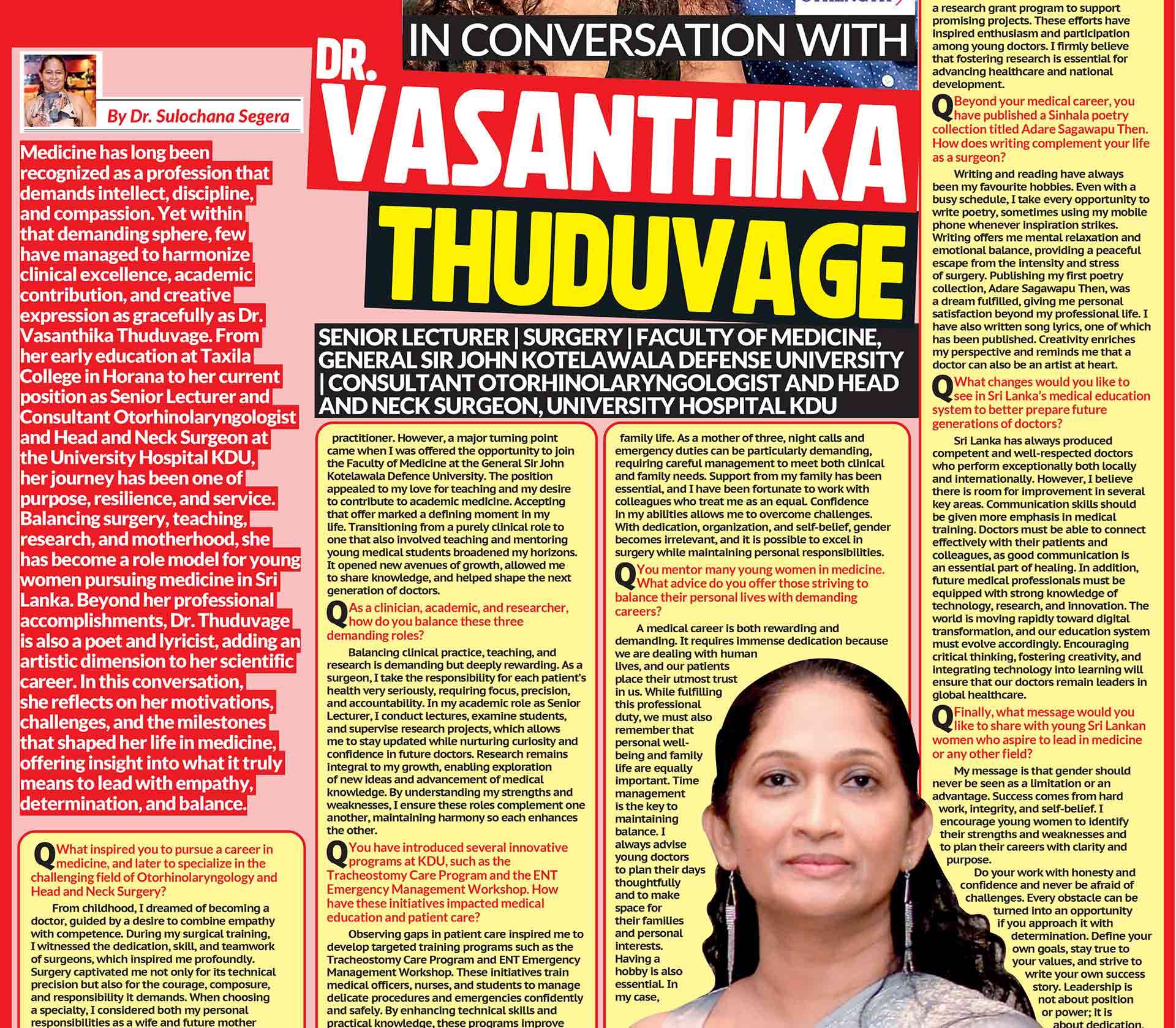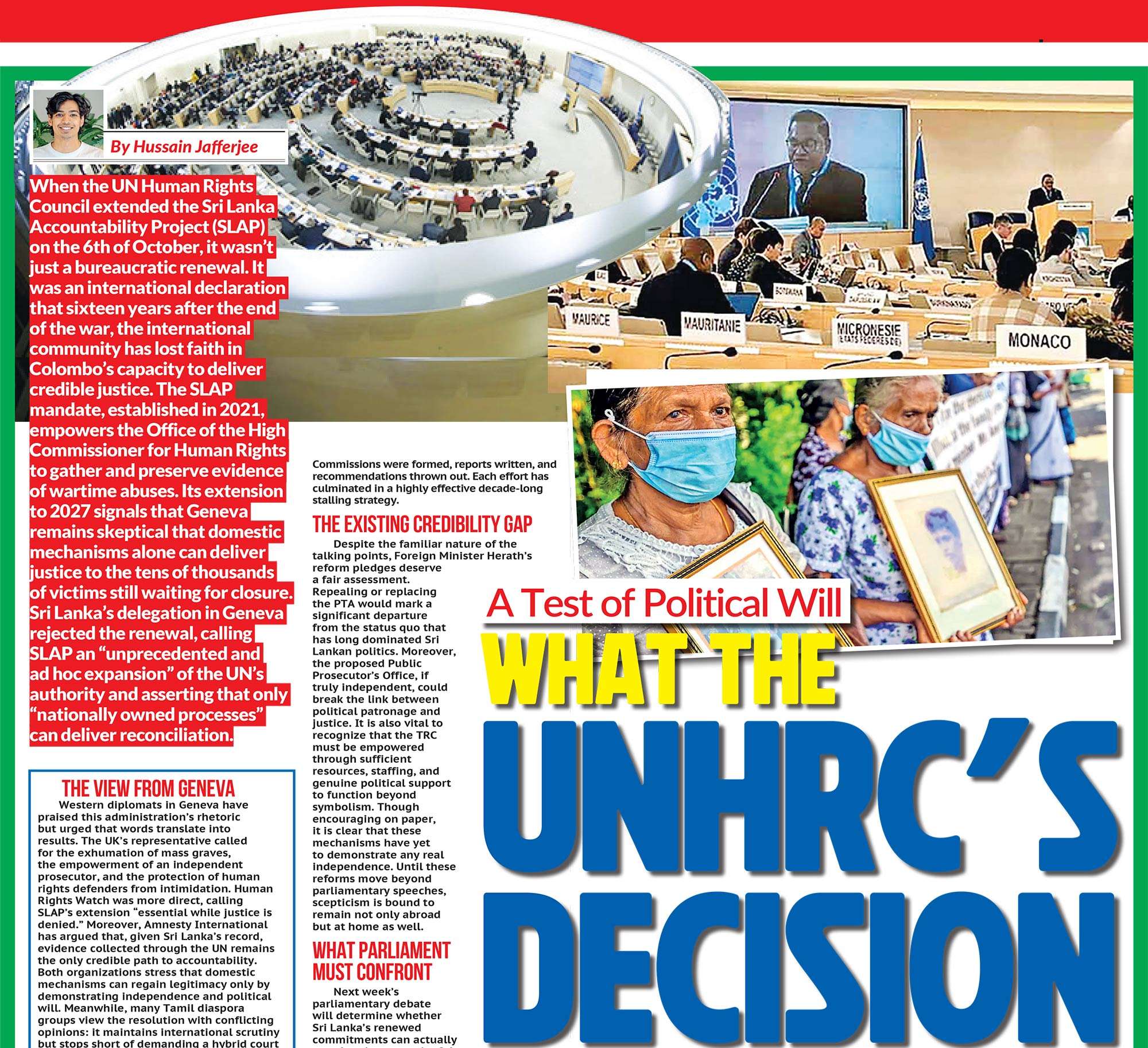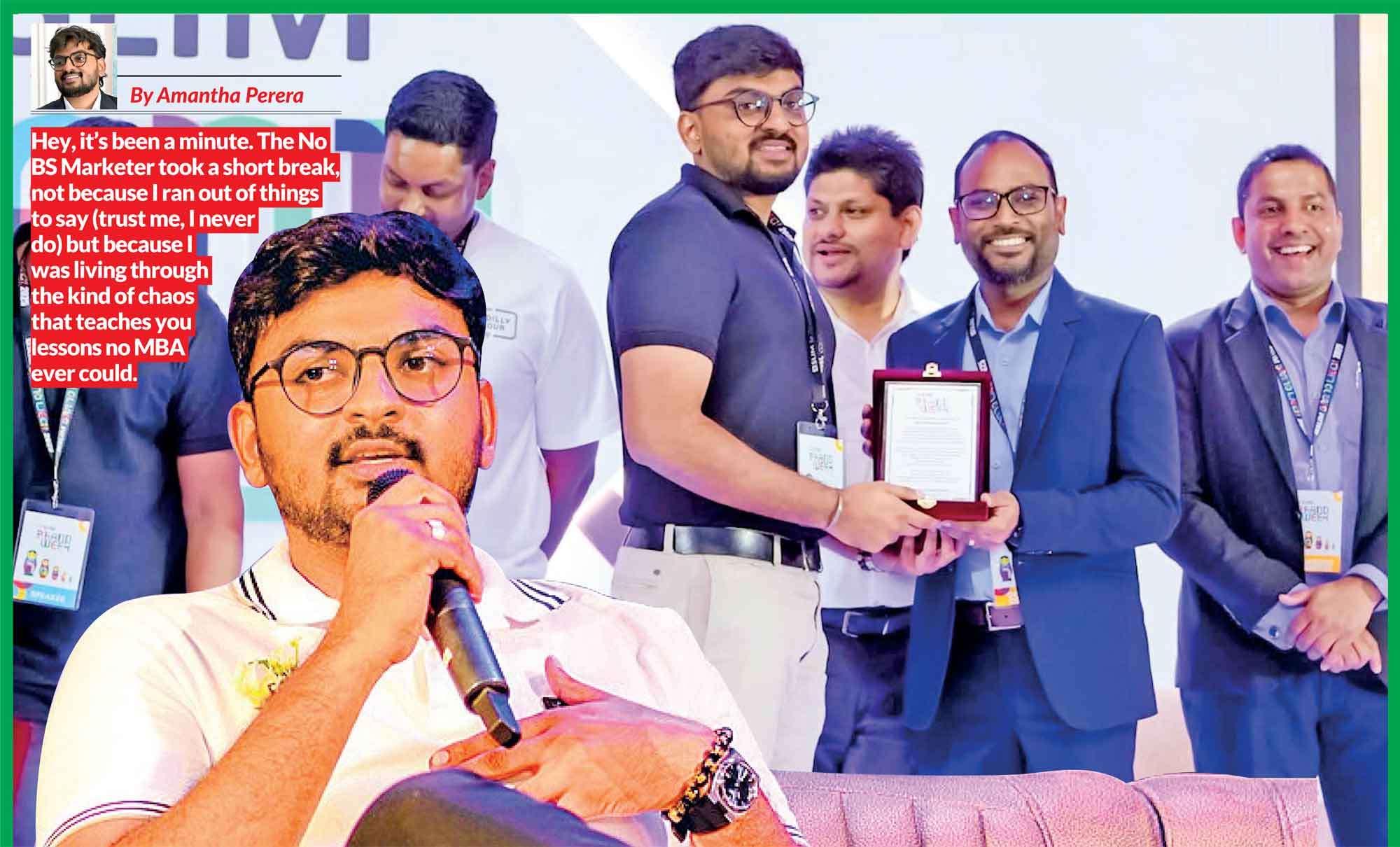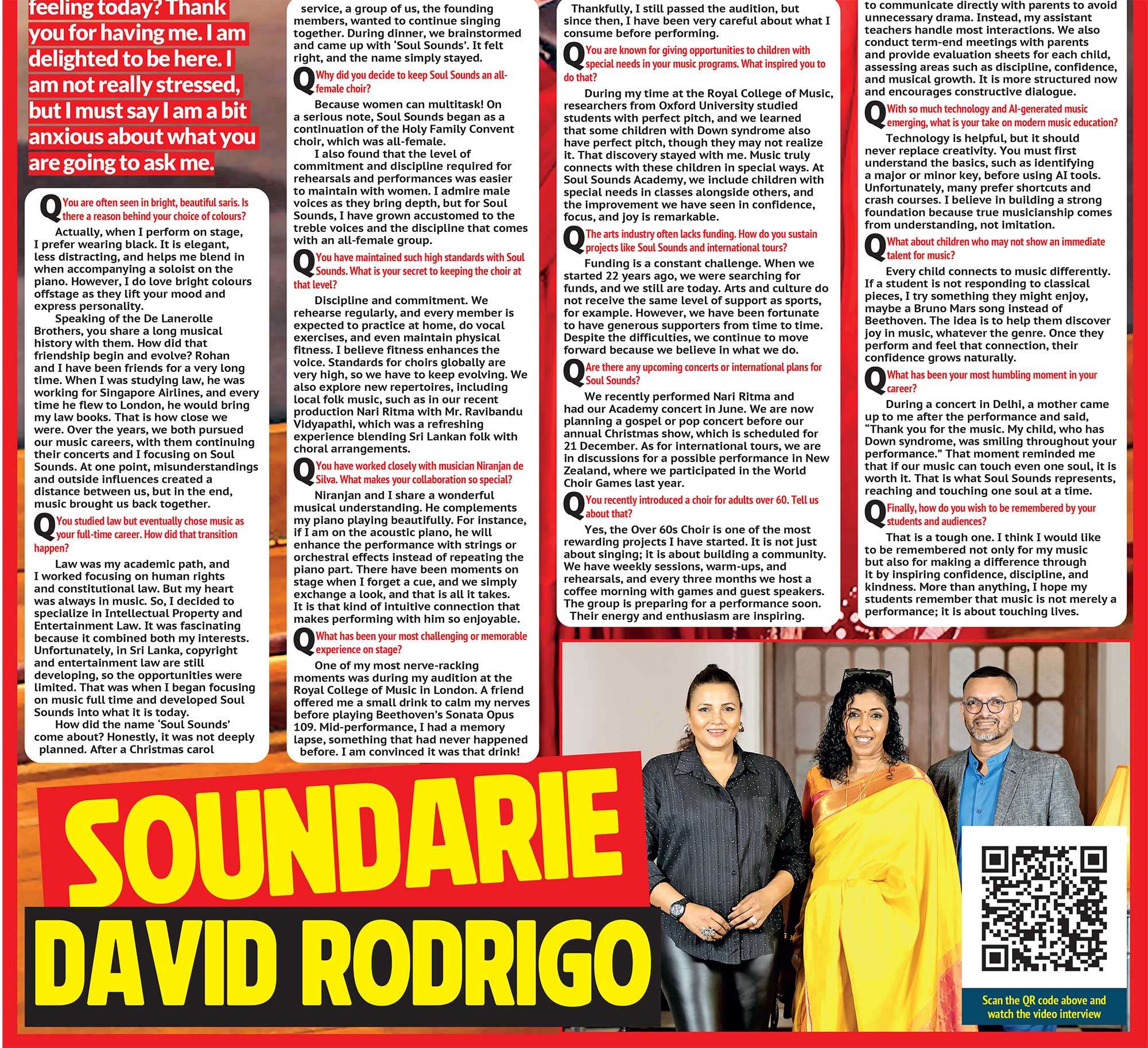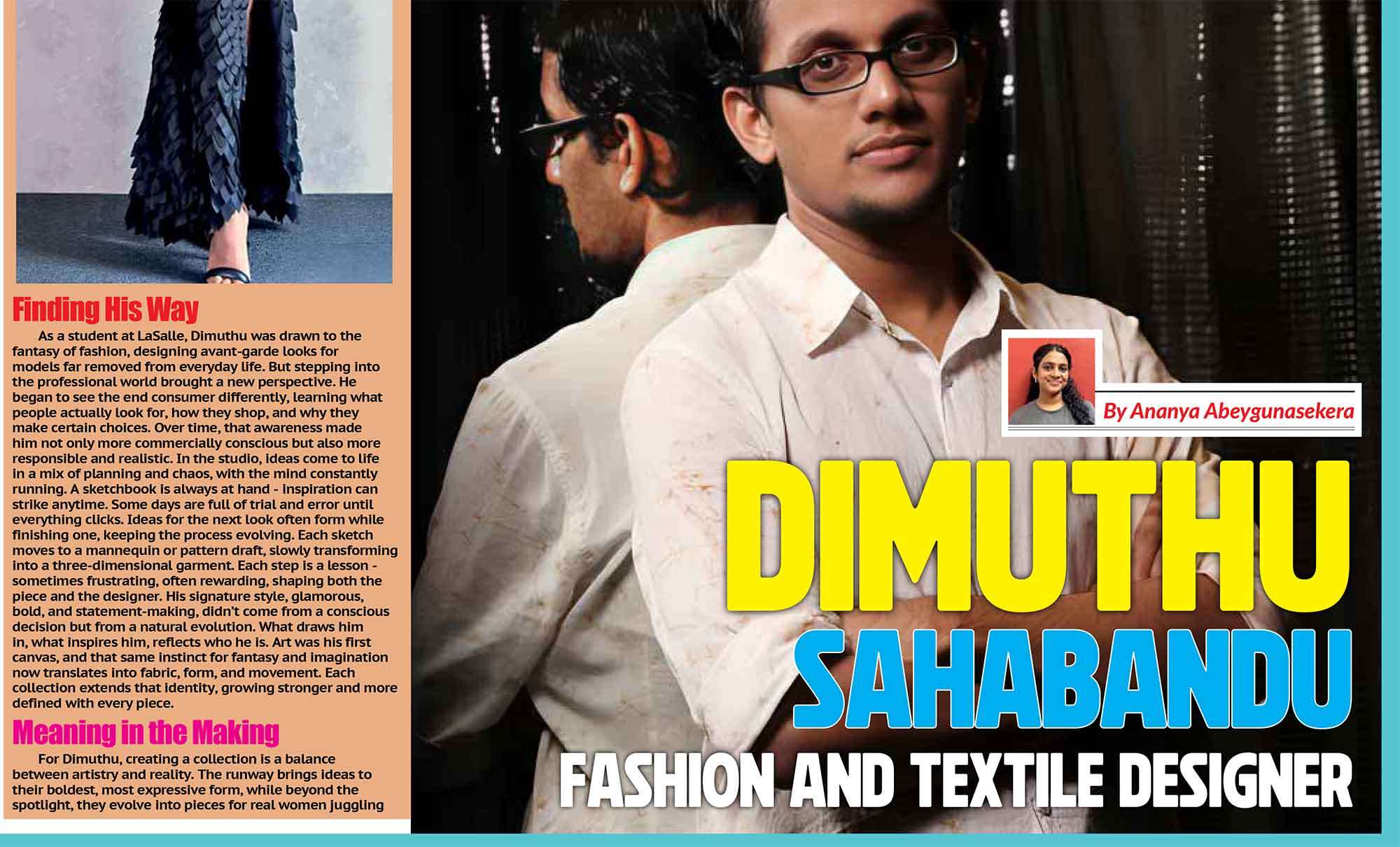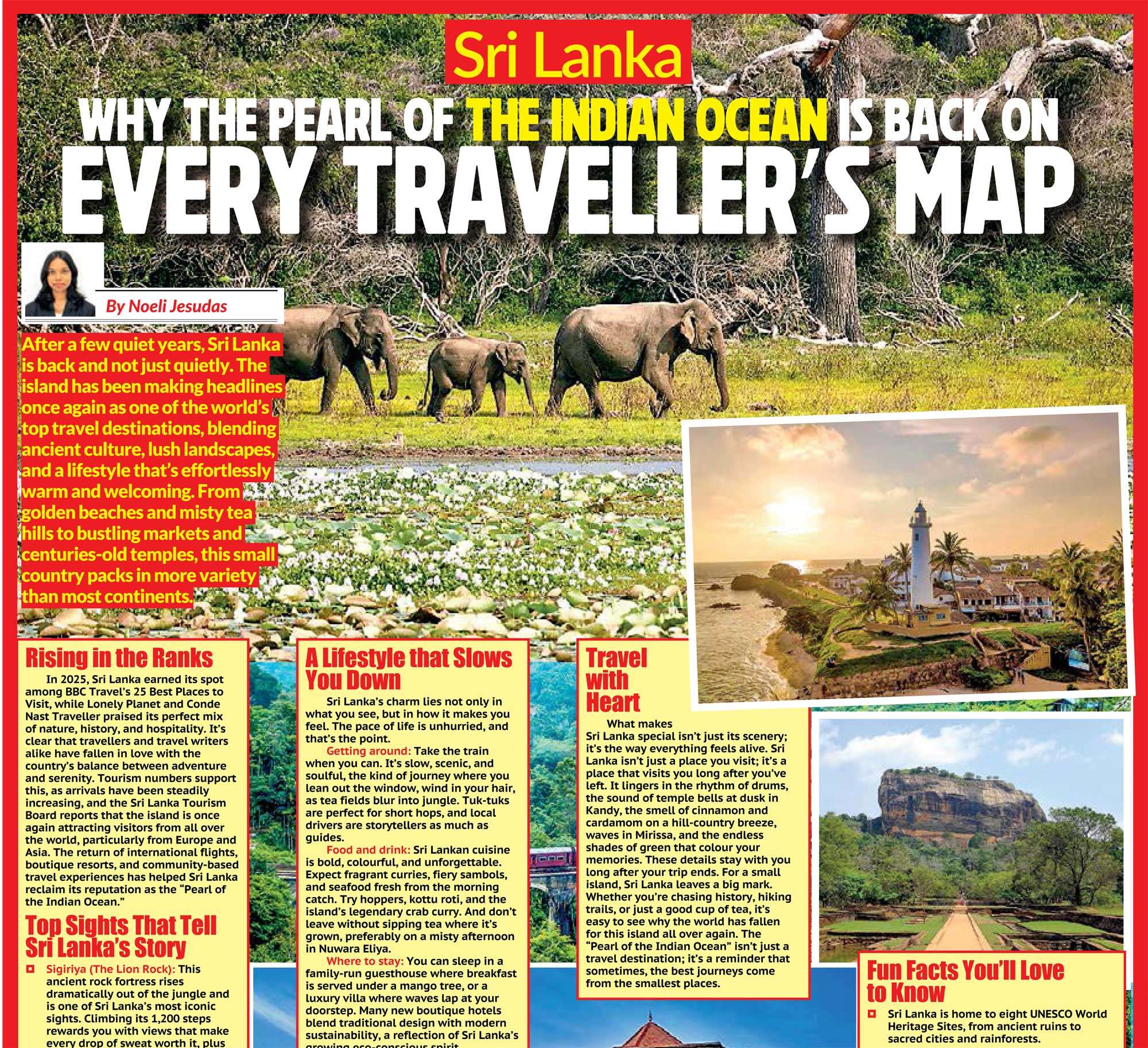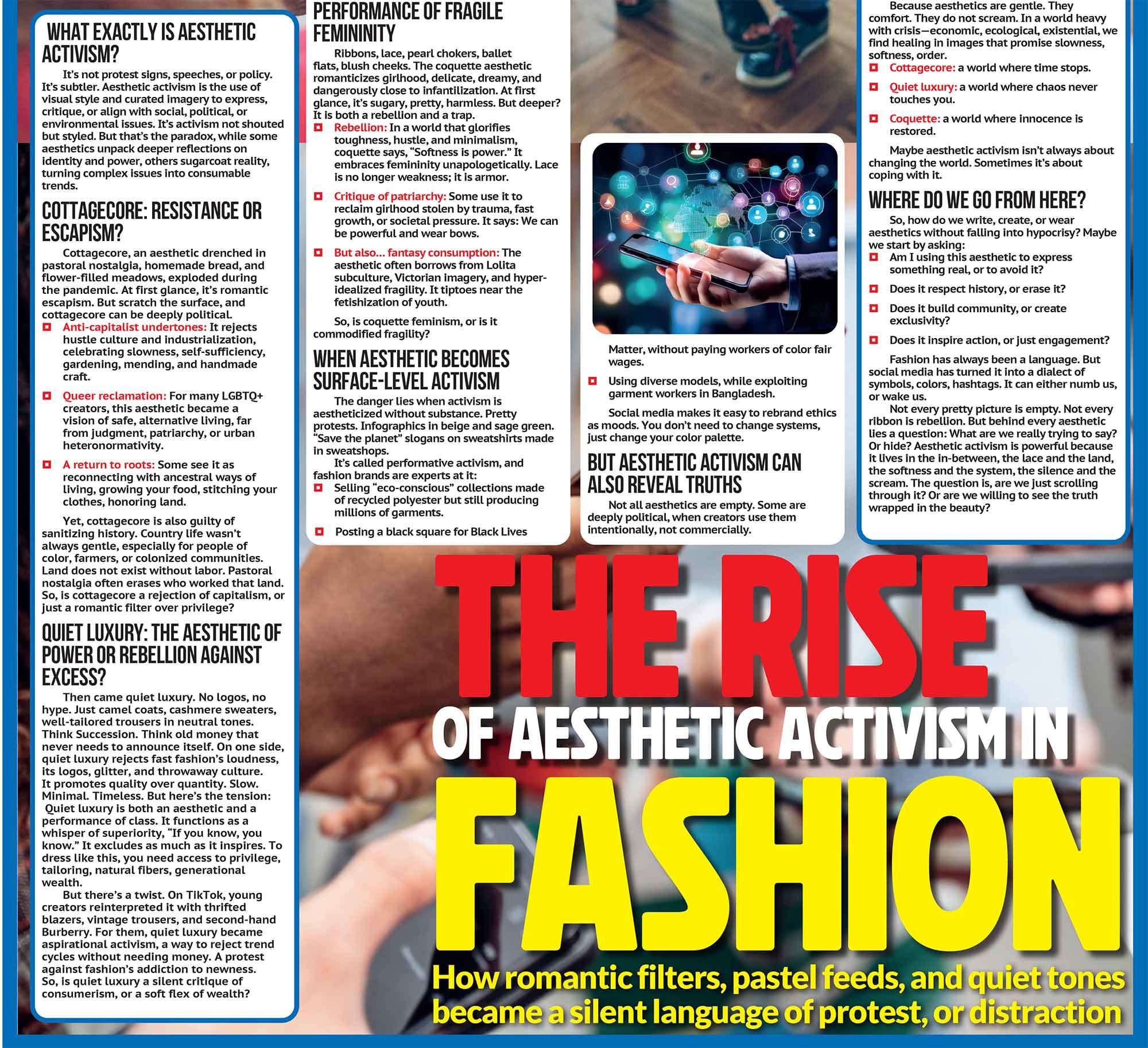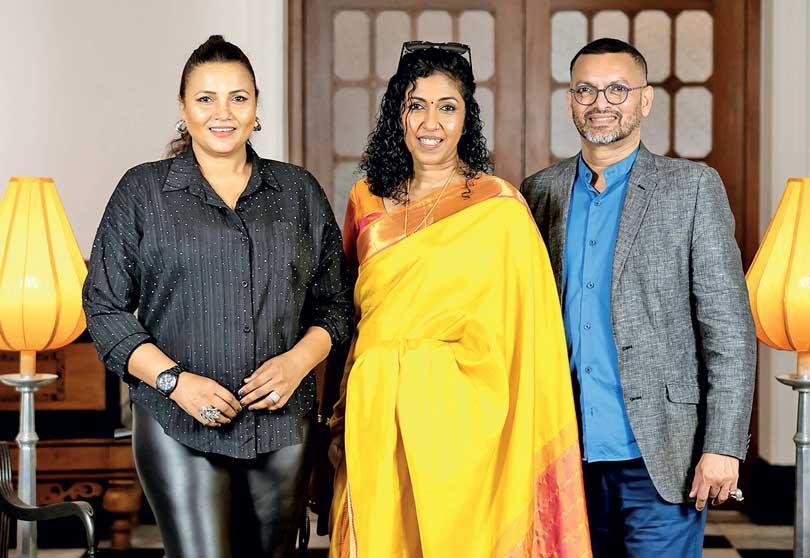
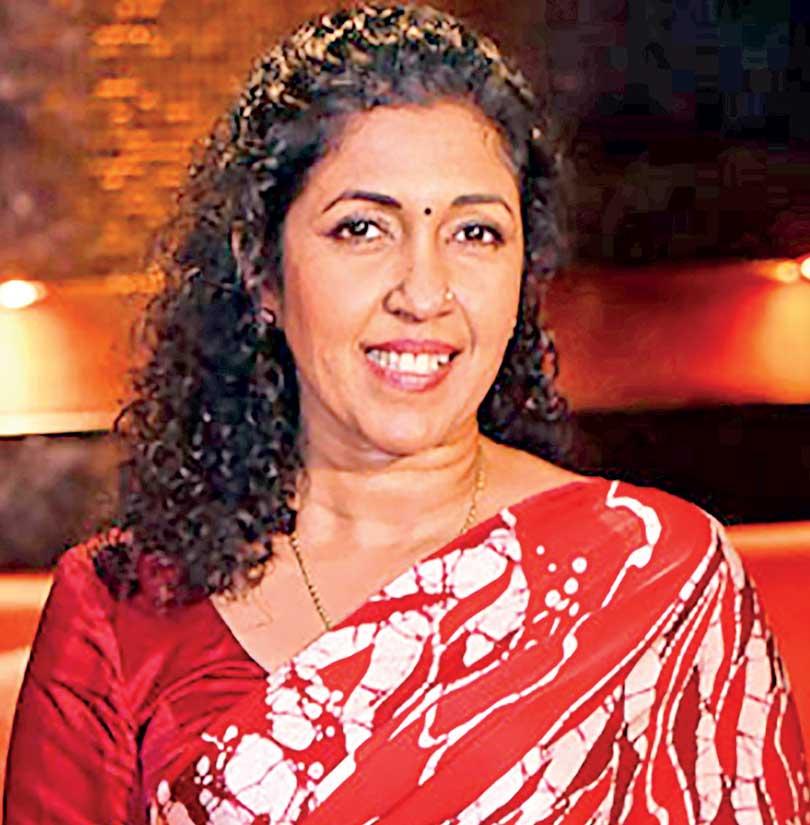
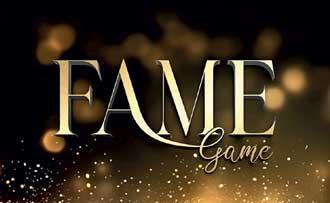 Known for her poise, warmth, and musical brilliance, Soundarie David Rodrigo has long been a driving force in Sri Lanka’s choral music scene. As the founder and Music Director of Soul Sounds, Sri Lanka’s internationally acclaimed all-female choir, she continues to inspire generations through her passion for music, discipline, and leadership. In this candid conversation on Fame Game, hosted by Kumar de Silva and Rozanne Diasz, Soundarie opens up about her journey, from her love for saris to her musical beginnings, challenges, and the soulful purpose behind her work.
Known for her poise, warmth, and musical brilliance, Soundarie David Rodrigo has long been a driving force in Sri Lanka’s choral music scene. As the founder and Music Director of Soul Sounds, Sri Lanka’s internationally acclaimed all-female choir, she continues to inspire generations through her passion for music, discipline, and leadership. In this candid conversation on Fame Game, hosted by Kumar de Silva and Rozanne Diasz, Soundarie opens up about her journey, from her love for saris to her musical beginnings, challenges, and the soulful purpose behind her work.
Welcome to the show, Soundarie. It is wonderful to have you on Fame Game. Kumar has been singing your praises ever since we added your name to the guest list. How are you feeling today?
Thank you for having me. I am delighted to be here. I am not really stressed, but I must say I am a bit anxious about what you are going to ask me.
You are often seen in bright, beautiful saris. Is there a reason behind your choice of colours?
Actually, when I perform on stage, I prefer wearing black. It is elegant, less distracting, and helps me blend in when accompanying a soloist on the piano. However, I do love bright colours offstage as they lift your mood and express personality.
Speaking of the De Lanerolle Brothers, you share a long musical history with them. How did that friendship begin and evolve?
Rohan and I have been friends for a very long time. When I was studying law, he was working for Singapore Airlines, and every time he flew to London, he would bring my law books. That is how close we were. Over the years, we both pursued our music careers, with them continuing their concerts and I focusing on Soul Sounds. At one point, misunderstandings and outside influences created a distance between us, but in the end, music brought us back together.
You studied law but eventually chose music as your full-time career. How did that transition happen?
Law was my academic path, and I worked focusing on human rights and constitutional law. But my heart was always in music. So, I decided to specialize in Intellectual Property and Entertainment Law. It was fascinating because it combined both my interests. Unfortunately, in Sri Lanka, copyright and entertainment law are still developing, so the opportunities were limited. That was when I began focusing on music full time and developed Soul Sounds into what it is today.
How did the name ‘Soul Sounds’ come about?
Honestly, it was not deeply planned. After a Christmas carol service, a group of us, the founding members, wanted to continue singing together. During dinner, we brainstormed and came up with ‘Soul Sounds’. It felt right, and the name simply stayed.
Why did you decide to keep Soul Sounds an all-female choir?
Because women can multitask! On a serious note, Soul Sounds began as a continuation of the Holy Family Convent choir, which was all-female.
I also found that the level of commitment and discipline required for rehearsals and performances was easier to maintain with women. I admire male voices as they bring depth, but for Soul Sounds, I have grown accustomed to the treble voices and the discipline that comes with an all-female group.
You have maintained such high standards with Soul Sounds. What is your secret to keeping the choir at that level?
Discipline and commitment. We rehearse regularly, and every member is expected to practice at home, do vocal exercises, and even maintain physical fitness. I believe fitness enhances the voice. Standards for choirs globally are very high, so we have to keep evolving. We also explore new repertoires, including local folk music, such as in our recent production Nari Ritma with Mr. Ravibandu Vidyapathi, which was a refreshing experience blending Sri Lankan folk with choral arrangements.
You have worked closely with musician Niranjan de Silva. What makes your collaboration so special?
Niranjan and I share a wonderful musical understanding. He complements my piano playing beautifully. For instance, if I am on the acoustic piano, he will enhance the performance with strings or orchestral effects instead of repeating the piano part. There have been moments on stage when I forget a cue, and we simply exchange a look, and that is all it takes. It is that kind of intuitive connection that makes performing with him so enjoyable.
What has been your most challenging or memorable experience on stage?
One of my most nerve-racking moments was during my audition at the Royal College of Music in London. A friend offered me a small drink to calm my nerves before playing Beethoven’s Sonata Opus 109. Mid-performance, I had a memory lapse, something that had never happened before. I am convinced it was that drink! Thankfully, I still passed the audition, but since then, I have been very careful about what I consume before performing.
You are known for giving opportunities to children with special needs in your music programs. What inspired you to do that?
During my time at the Royal College of Music, researchers from Oxford University studied students with perfect pitch, and we learned that some children with Down syndrome also have perfect pitch, though they may not realize it. That discovery stayed with me. Music truly connects with these children in special ways. At Soul Sounds Academy, we include children with special needs in classes alongside others, and the improvement we have seen in confidence, focus, and joy is remarkable.
The arts industry often lacks funding. How do you sustain projects like Soul Sounds and international tours?
Funding is a constant challenge. When we started 22 years ago, we were searching for funds, and we still are today. Arts and culture do not receive the same level of support as sports, for example. However, we have been fortunate to have generous supporters from time to time. Despite the difficulties, we continue to move forward because we believe in what we do.
Are there any upcoming concerts or international plans for Soul Sounds?
We recently performed Nari Ritma and had our Academy concert in June. We are now planning a gospel or pop concert before our annual Christmas show, which is scheduled for 21 December. As for international tours, we are in discussions for a possible performance in New Zealand, where we participated in the World Choir Games last year.
You recently introduced a choir for adults over 60. Tell us about that.
Yes, the Over 60s Choir is one of the most rewarding projects I have started. It is not just about singing; it is about building a community. We have weekly sessions, warm-ups, and rehearsals, and every three months we host a coffee morning with games and guest speakers. The group is preparing for a performance soon. Their energy and enthusiasm are inspiring.
Apart from choir training, what else does the Soul Sounds Academy offer?
We have a full-fledged music academy with over 20 teachers. We offer lessons in piano, violin, guitar, and musical theatre. We stopped drum classes recently due to space issues, but the rest of the programs are thriving. It is a happy and creative space.
How do you manage parents who can sometimes be demanding in the academy setting?
That can be challenging. I usually try not to communicate directly with parents to avoid unnecessary drama. Instead, my assistant teachers handle most interactions. We also conduct term-end meetings with parents and provide evaluation sheets for each child, assessing areas such as discipline, confidence, and musical growth. It is more structured now and encourages constructive dialogue.
With so much technology and AI-generated music emerging, what is your take on modern music education?
Technology is helpful, but it should never replace creativity. You must first understand the basics, such as identifying a major or minor key, before using AI tools. Unfortunately, many prefer shortcuts and crash courses. I believe in building a strong foundation because true musicianship comes from understanding, not imitation.
What about children who may not show an immediate talent for music?
Every child connects to music differently. If a student is not responding to classical pieces, I try something they might enjoy, maybe a Bruno Mars song instead of Beethoven. The idea is to help them discover joy in music, whatever the genre. Once they perform and feel that connection, their confidence grows naturally.
What has been your most humbling moment in your career?
During a concert in Delhi, a mother came up to me after the performance and said, “Thank you for the music. My child, who has Down syndrome, was smiling throughout your performance.” That moment reminded me that if our music can touch even one soul, it is worth it. That is what Soul Sounds represents, reaching and touching one soul at a time.
Finally, how do you wish to be remembered by your students and audiences?
That is a tough one. I think I would like to be remembered not only for my music but also for making a difference through it by inspiring confidence, discipline, and kindness. More than anything, I hope my students remember that music is not merely a performance; it is about touching lives.
------------------------
Fame Game once again spotlighted a remarkable individual whose artistry continues to inspire. Soundarie David Rodrigo is more than a musician or choir director. She is a mentor, a leader, and above all, a believer in the power of music to heal, unite, and uplift.



